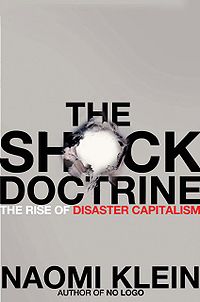
Shock Doctrine, The Rise of Disaster Capitalism
a book by Naomi Klein
From: Richard Moore <rkm@quaylargo.com>
Friends,
If you haven't seen Naomi Klein's Shock Doctrine, The Rise of Disaster
Capitalism, I highly recommend it for its timeliness:
http://tinyurl.com/c2ytqy
She talks about how major shocks, such as tsunamis, stock market crashes, or
whatever, have often been systematically exploited, as opportunities to
introduce all kinds of changes, because leaders can get by with it when people
are in shock. She explains how this is a conscious strategy, and is actually
referred to by the perpetrators as the shock doctrine, as in shock and awe.
Indeed, it is basically the 'weapon of choice' for implementing major changes
these days. It's in vogue, on a roll.
The aftermath of 9/11 is a classic example of Shock Doctrine, regardless of who
knocked down the buildings. Actually it's more than classic, it set new records
both for shock intensity and for shock payoffs. One whole constitution, along
with international law, gone in a puff of pulverized tower.
The economic-collapse shock is I would say on a still grander scale than 9/11.
It's a big slow-motion shock that will be affecting more and more of us
directly, and it's benefits are only beginning to be reaped. The bailout scams
we've seen, and the beginning of austerity, but the centralization of global
power is only beginning, the foundations being laid, as per recent G20 actions.
Kissinger made it very clear in a recent statement, that this is a grand
opportunity, not to be missed, and that the most should be made of it. He speaks
of course from the perspective of his patrons, the central bankers.
In other words, from the Kissinger perspective, now is the time to pull out all
the stops, send in all the reserves, go for a full-court press. With that as a
background, and taking into account the billions that have been spent on
bio-weapons R&D by the Pentagon, I think we need to keep an open mind regarding
what this unlikely-hybrid swine flu is all about.
rkm
